新人教版七年级英语下册Unit 2 What time do you go to school Section A 3a-3c导学案
- 格式:doc
- 大小:50.50 KB
- 文档页数:2
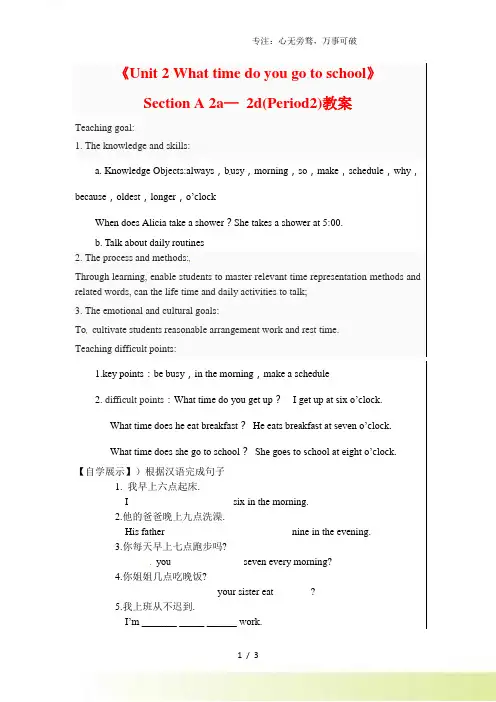
《Unit 2 What time do you go to school》Section A 2a—2d(Period2)教案Teaching goal:1. The knowledge and skills:a. Knowledge Objects:always,b usy,morning,so,make,schedule,why,because,oldest,longer,o’clockWhen does Alicia take a shower?She takes a shower at 5:00.b. Talk about daily routines2. The process and methods:Through learning, enable students to master relevant time representation methods and related words, can the life time and daily activities to talk;3. The emotional and cultural goals:To cultivate students reasonable arrangement work and rest time.Teaching difficult points:1.key points:be busy,in the morning,make a schedule2. difficult points:What time do you get up?I get up at six o’clock.What time does he eat breakfast?He eats b reakfast at seven o’clock.What time does she go to school?She goes to school at eight o’clock.【自学展示】)根据汉语完成句子1. 我早上六点起床.I ______ ______ _______ six in the morning.2.他的爸爸晚上九点洗澡.His father ______ ______ _______ ____ nine in the evening.3.你每天早上七点跑步吗?_____ you _______ ______ seven every morning?4.你姐姐几点吃晚饭?______ ______ _____ your sister eat _______?5.我上班从不迟到.I’m _______ _____ ______ work.6.他十二点吃午饭.He ______ _____ at twelve.【合作学习】1.Greet the class as usual and check the homework.Ask pairs of students to act out the conversation in Activity 1b.2. 2aa.Now open your books at Page 66.Look at Activity 2a.There is a picture.Can you guess who they are?Well,we’ll listen to a conversation.Then you’ll k now the answer.b. Play the recording first.Students only listen.Then for a second time.This time students can 3. 2bT:Rick has two brothers and two sisters.But his family has only one shower.So Rick made a shower schedule.Listen to the conversation again and fill in the time when each family member takes a shower.4. 2c Pairwork【质疑导学】1. what time 与when 的区别when与what time都可以用来询问时间,相当于汉语的“什么时候”,它们之间的异同点如下:1)询问做某事的具体时间(钟点)时两者可以互换如:你什么时候去上学?— When / What time do you go to school?— I go to school at seven o’clock.2) 询问钟表所显示的时间时,只能用what timee.g. —What time is it? (=What’s the time) 几点了? —It’s eight thirty.八点半。
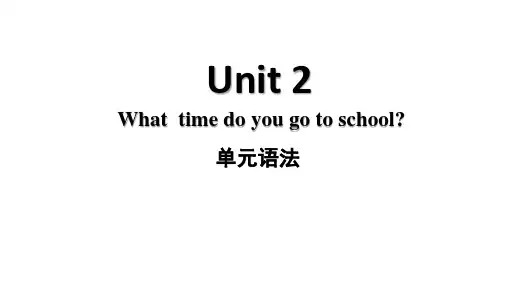
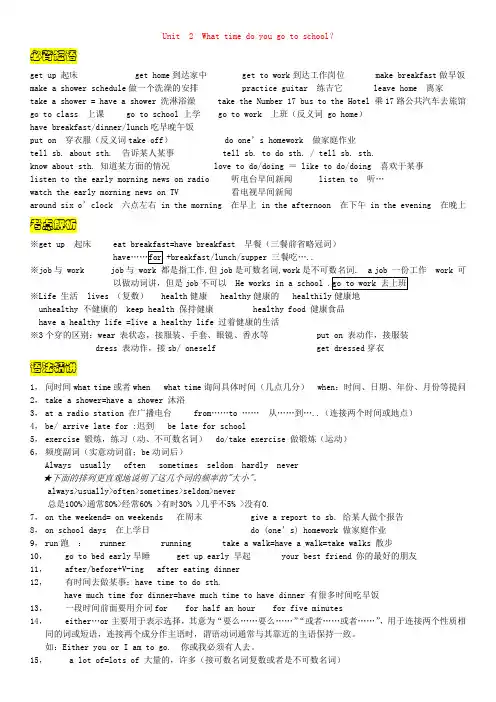
Unit 2 What time do you go to school?必背短语get up 起床 get home到达家中 get to work到达工作岗位 make breakfast做早饭make a shower schedule做一个洗澡的安排 practice guitar 练吉它 leave home 离家take a shower = have a shower 洗淋浴澡 take the Number 17 bus to the Hotel 乘17路公共汽车去旅馆go to class 上课 go to school 上学 go to work 上班(反义词 go home)have breakfast/dinner/lunch吃早晚午饭put on 穿衣服(反义词take off) do one’s homework 做家庭作业tell sb. about sth. 告诉某人某事 tell sb. to do sth. / tell sb. sth.know about sth. 知道某方面的情况 love to do/doing = like to do/doing 喜欢干某事listen to the early morning news on radio 听电台早间新闻 listen to 听…watch the early morning news on TV 看电视早间新闻around six o’clock 六点左右 in the morning 在早上 in the afternoon 在下午 in the evening 在晚上考点解析※get up 起床 eat breakfast=have breakfast 早餐(三餐前省略冠词)have三餐吃…..※job与 work job与 work 都是指工作,但job是可数名词,work是不可数名词. a job 一份工作 work 可以做动词讲,但是job不可以※Life 生活 lives (复数) health健康 healthy健康的 healthily健康地unhealthy 不健康的 keep health 保持健康 healthy food 健康食品have a healthy life =live a healthy life 过着健康的生活※3个穿的区别:wear 表状态,接服装、手套、眼镜、香水等 put on 表动作,接服装dress 表动作,接sb/ oneself get dressed穿衣语法精讲1,问时间what time或者when what time询问具体时间(几点几分) when:时间、日期、年份、月份等提问2,take a shower=have a shower 沐浴3,at a radio station 在广播电台 from……to ……从……到…..(连接两个时间或地点)4,be/ arrive late for :迟到 be late for school5,exercise 锻炼,练习(动、不可数名词) do/take exercise 做锻炼(运动)6,频度副词(实意动词前;be动词后)Always usually often sometimes seldom hardly never★下面的排列更直观地说明了这几个词的频率的"大小"。
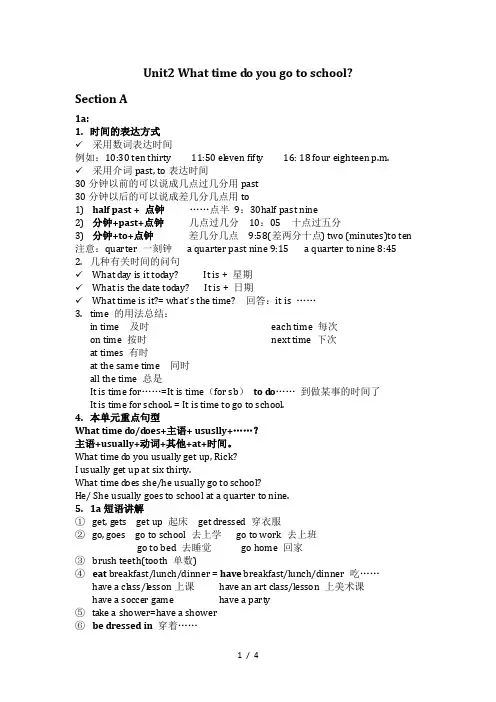
Unit2 What time do you go to school?Section A1a:1.时间的表达方式✓采用数词表达时间例如:10:30 ten thirty 11:50 el even fifty 16: 18 four eighteen p.m.✓采用介词past, to表达时间30分钟以前的可以说成几点过几分用past30分钟以后的可以说成差几分几点用to1)half past + 点钟……点半9:30half past nine2)分钟+past+点钟几点过几分10:05 十点过五分3)分钟+to+点钟差几分几点9:58(差两分十点) two (minutes)to ten 注意:quarter 一刻钟 a quarter past nine 9:15 a quarter to nine 8:45 2.几种有关时间的问句✓What day is it today? It is + 星期✓What is the date today? It is + 日期✓What time is it?= what’s the time? 回答:it is ……3.time 的用法总结:in time 及时on time 按时at times 有时at the same time 同时all the time 总是each time 每次next time 下次It is time for……=It is time(for sb)to do……到做某事的时间了It is time for school. = It is time to go to school.4.本单元重点句型What time do/does+主语+ ususlly+……?主语+usually+动词+其他+at+时间。
What time d o you usually get up, Rick?I usually get up at six thirty.What time d oes she/he usually go to school?He/ She usually goes to school at a quarter to nine.5.1a短语讲解①get, gets get up 起床get dressed 穿衣服②go, goes go to school 去上学go to work 去上班go to bed 去睡觉go home 回家③brush teeth(tooth 单数)④eat breakfast/lunch/dinner = have breakfast/lunch/dinner 吃……have a class/lesson上课have an art class/lesson 上美术课have a soccer game have a party⑤take a shower=have a shower⑥be dressed in穿着……My father is dressed in a white shirt.dress sb给某人穿衣服My mother asks me to dress my sisterdress oneself某人自己穿衣服The girl can dress herself.oneself 指反身代词包括myself,yourself,herself,himself,itself,ourselves yourselves,themselves2d6.比较两个“工作”:①job 为可数名词,表示具体的职业,只能做名词.I’m a teacher. I have a good job.②work为不可数名词,指日常生活工作中从事的体力活脑力劳动;work还可做动词.He has a lot of work to do today.7.in, on, at,for辨析1)in the morning/afternoon/evening=at nightin spring/summer/autumn/winterin this month/season/year in 1995/20162) on 常与日期/星期搭配,表示在“具体的某一天”on October second/2nd在十月十二日on Monday 在星期一3)介词at 常与具体的几点几分连用at 9:00 in the morningat a/ the station at a radio station 在广播站at home , at school4)for 后边加一段时间for two hours for ten minutesI have a class for 45minutes at school. What about you?We have sports for about(大约) one hour at school today.今天我们在学校做了大约一小时的运动。
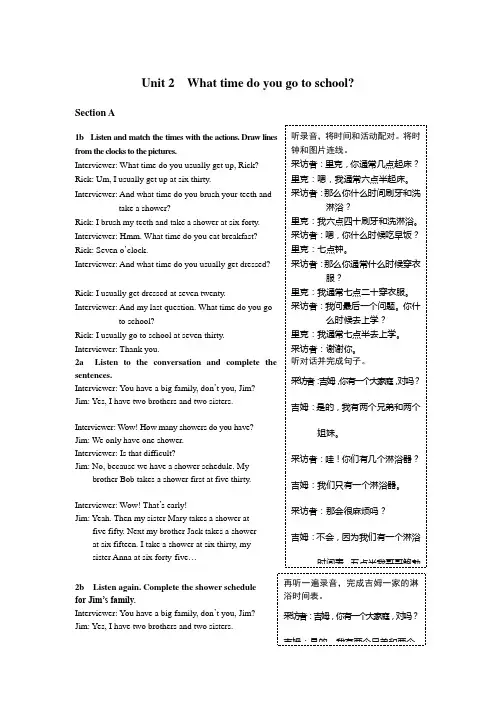
Unit 2 What time do you go to school? Section A1b Listen and match the times with the actions. Draw lines from the clocks to the pictures.Interviewer: What time do you usually get up, Rick? Rick: Um, I usually get up at six thirty.Interviewer: And what time do you brush your teeth and take a shower?Rick: I brush my teeth and take a shower at six forty. Interviewer: Hmm. What time do you eat breakfast? Rick: Seven o’clock.Interviewer: And what time do you usually get dressed?Rick: I usually get dressed at seven twenty. Interviewer: And my last question. What time do you go to school?Rick: I usually go to school at seven thirty. Interviewer: Thank you.2a Listen to the conversation and complete the sentences.Interviewer: You have a big family, don’t you, Jim? Jim: Yes, I have two brothers and two sisters.Interviewer: Wow! How many showers do you have? Jim: We only have one shower.Interviewer: Is that difficult?Jim: No, because we have a shower schedule. My brother Bob takes a shower first at five thirty.Interviewer: Wow! That’s early!Jim: Yeah. Then my sister Mary takes a shower at five fifty. Next my brother Jack takes a showerat six fifteen. I take a shower at six thirty, mysister Anna at six forty-five…2b Listen again. Complete the shower schedulefor Jim’s family.Interviewer: You have a big family, don’t you, Jim? Jim: Yes, I have two brothers and two sisters.听录音,将时间和活动配对。
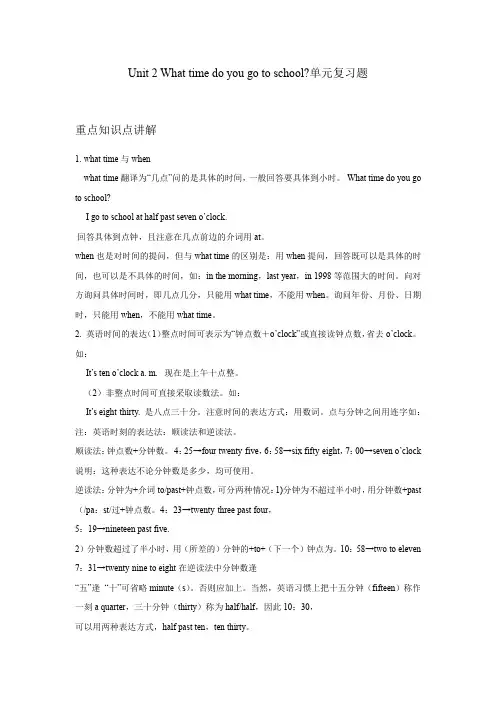
Unit 2 What time do you go to school?单元复习题重点知识点讲解1. what time与whenwhat time翻译为“几点”问的是具体的时间,一般回答要具体到小时。
What time do you go to school?I go to school at half past seven o’clock.回答具体到点钟,且注意在几点前边的介词用at。
when也是对时间的提问,但与what time的区别是:用when提问,回答既可以是具体的时间,也可以是不具体的时间,如:in the morning,last year,in 1998等范围大的时间。
向对方询问具体时间时,即几点几分,只能用what time,不能用when。
询问年份、月份、日期时,只能用when,不能用what time。
2. 英语时间的表达(1)整点时间可表示为“钟点数+o’clock”或直接读钟点数,省去o’clock。
如:It’s ten o’clock a. m.现在是上午十点整。
(2)非整点时间可直接采取读数法。
如:It’s eight-thirty. 是八点三十分。
注意时间的表达方式:用数词。
点与分钟之间用连字如:注:英语时刻的表达法:顺读法和逆读法。
顺读法:钟点数+分钟数。
4:25→four twenty-five,6:58→six fifty-eight,7:00→seven o’clock 说明:这种表达不论分钟数是多少,均可使用。
逆读法:分钟为+介词to/past+钟点数,可分两种情况:1)分钟为不超过半小时,用分钟数+past (/pa:st/过+钟点数。
4:23→t wenty-three past four,5:19→nineteen past five.2)分钟数超过了半小时,用(所差的)分钟的+to+(下一个)钟点为。
10:58→two to eleven 7:31→twenty-nine to eight在逆读法中分钟数逢“五”逢“十”可省略minute(s)。

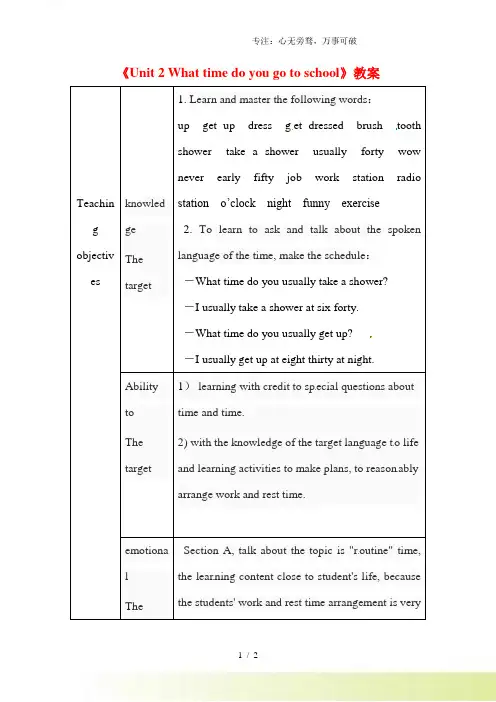
《Unit 2 What time do you go to school》教案Teaching objectives knowledgeThetarget1. Learn and master the following words:up get up dress g et dressed brush toothshower take a shower usually forty wownever early fifty job work station radiostation o’clock night funny exercise2. To learn to ask and talk about the spokenlanguage of the time, make the schedule:-What time do you usually take a shower?-I usually take a shower at six forty.-What time do you usually get up?-I usually get up at eight thirty at night.AbilitytoThetarget1) learning with credit to special questions abouttime and time.2) with the knowledge of the target language t o lifeand learning activities to make plans, to reasonablyarrange work and rest time.emotionalTheSection A, talk about the topic is "routine" time,the learning content close to student's life, becausethe students' work and rest time arrangement is verytarget regular. By asking each other or talk about yourself or a loved one's work and rest time arrangementand activity plan, and punctuality can cultivatestudents' good habit, the habit.Teaching important points Learn to ask and talk about time and make the schedule.Teaching difficultpoints Credit to guide the expression of special questionsand time.The teachingmethodTask-based teaching method and teaching.。

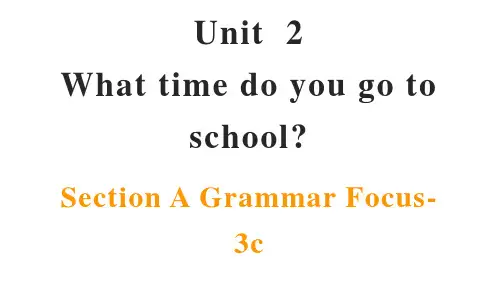
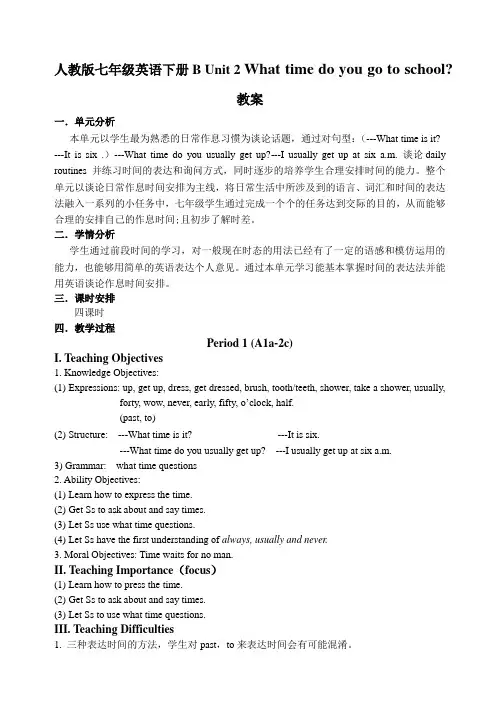
人教版七年级英语下册B Unit 2 What time do you go to school?教案一.单元分析本单元以学生最为熟悉的日常作息习惯为谈论话题,通过对句型:(---What time is it? ---It is six .)---What time do you usually get up?---I usually get up at six a.m. 谈论daily routines并练习时间的表达和询问方式,同时逐步的培养学生合理安排时间的能力。
整个单元以谈论日常作息时间安排为主线,将日常生活中所涉及到的语言、词汇和时间的表达法融入一系列的小任务中,七年级学生通过完成一个个的任务达到交际的目的,从而能够合理的安排自己的作息时间;且初步了解时差。
二.学情分析学生通过前段时间的学习,对一般现在时态的用法已经有了一定的语感和模仿运用的能力,也能够用简单的英语表达个人意见。
通过本单元学习能基本掌握时间的表达法并能用英语谈论作息时间安排。
三.课时安排四课时四.教学过程Period 1 (A1a-2c)I. Teaching Objectives1. Knowledge Objectives:(1) Expressions: up, get up, dress, get dressed, brush, tooth/teeth, shower, take a shower, usually,forty, wow, never, early, fifty, o’clock, half.(past, to)(2) Structure: ---What time is it? ---It is six.---What time do you usually get up? ---I usually get up at six a.m.3) Grammar: what time questions2. Ability Objectives:(1) Learn how to express the time.(2) Get Ss to ask about and say times.(3) Let Ss use what time questions.(4) Let Ss have the first understanding of always, usually and never.3. Moral Objectives: Time waits for no man.II. Teaching Importance(focus)(1) Learn how to press the time.(2) Get Ss to ask about and say times.(3) Let Ss to use what time questions.III. Teaching Difficulties1. 三种表达时间的方法,学生对past,to来表达时间会有可能混淆。
Unit 2 What time do you go to school?◆短语归纳1. what time 几点2. go to school 去上学3. get up 起床4. take a shower 洗淋浴5. brush teeth 刷牙6. get to 到达7. do homework 做家庭作业8. go to work 去上班9.go home 回家10. eat breakfast 吃早饭11. get dressed 穿上衣服12. get home 到家13. either…or… 要么…要么… 14. go to bed 上床睡觉15. in the morning/ afternoon/ evening 在上午/下午/晚上16. take a walk 散步17. lots of=a lot of 许多,大量18. radio station 广播电台19. at night 在晚上20. be late for=arrive late for 迟到1. at + 具体时间点在几点(几分)2. eat breakfast/ lunch/dinner 吃早饭/午饭/晚饭3. thirty\half past +基数词……点半4. fifteen\a quarter to +基数词差一刻到……点5. take a/an +名词从事……活动6. from …to … 从……到……7. need to do sth 需要做某事My School DayI am a student. I usually get up at seven, and I eat breakfast at seven thirty. Then I go to school at eight. School starts at eight thirty. I eat lunch at twelve. I go home at 17:00. I often eat dinner at 19:00 and then play the piano. I do my homework at 20:00. At 22:00, I go to bed.1.What time do you usually _____ _____?你通常几点起床?2.I usually get up _____ six thirty.我通常六点半起床。
Unit 2 What time do you go to school?Section A 1a — 1c (P7)* 教师寄语:No man can do two things at once. 一心不可二用。
【学习目标】:1. 熟练掌握本课单词和短语.2. 学会谈论自己及他人的日常生活及日常作息习惯,并能合理安排.3. 初步掌握时间表达法.【学习重点】:谈论自己及他人的日常生活及日常作息习惯.【体验学习】:1. go to school 去上学(school 前不用冠词)2. tooth (复数)3.eat breakfast = have breakfast 吃早饭4.take a shower = have a shower 洗澡,淋浴【课堂导学】:学习任务一:会读写新单词及短语。
1、个人自读、记忆本课单词。
2、小组互相检查单词读的情况。
3、小组内竞赛,看谁记得快、准,并展示(默写)单词:时间______________ 几点,什么时候___________...点钟______________ 短语:通常______________ 去上学_________________ 起床_______________ 淋浴;洗澡__________ 吃早饭_________________ 刷牙______________4、认真观察1a的图画,将词语与图片搭配,并核对答案。
学习任务二:利用时间表达法,自由的表达时间.1、个人读出下列时间.5:00 -- five o'clock 6:00 -- six o'clock7:00 -- seven o'clock 8:00 -- eight o'clock9:02 -- nine two 10:20 -- ten twenty11:35 -- eleven thirty-five2、小组为单位,读出1a中的时间.3、听录音,完成活动1b学习任务三:完成1c.运用句型What time 谈论Rick的日常生活及Rick一家的淋浴时间.1、熟读1a中的对话, 理解并复述.2、两人合作, 谈论Rick的日常生活(分别扮演Rick和采访者).3、熟读1b中的对话,理解并复述.4、小组为单位,两人合作, 谈论Rick一家的淋浴时间.【自主检测】:I、精挑细选1.Do you often _______ TV?A. seeB. watchC. look2. ______ do you get up in the morning?A. WhereB. What timeC. How3. When ______ Tom take a shower?A. doesB. doC. has4. What time does Ann ______ every day?A. go schoolB. go to the schoolC. go to school5. -----What time is it ?------It’s ______ 7:00. We often have breakfast ____7:00A. at, atB. /, atC. at, /II、按要求改写句子.1. Alicia takes a shower at 9:00.(提问划线部分)______________________________________?2. Mary takes a shower at 8:00.(变一般疑问句)_________ Mary ________ a shower at 8:00?3. I usually go to bed at 10:00.(变否定句)I _______ usually _______to bed at 10:00.4. She often runs in the morning.(对划线部分提问)________ _________ she often _________?5.I usually get up at five o’clock every day. (对划线部分提问)________ _________ ________ you get up every day?Unit 2 What time do you go to school?Section A 2a— 2d(P8)* 教师寄语:No man can do two things at once. 一心不可二用。
UNIT 2 What time do you go to school?Section A 第1课时(1a~1c)自主学习方案1. 自学生词,并记住拼读及拼写。
2. 预习课本找出重点短语及句子。
(见学案自学导练内容)3. 读记后完成自学导练内容。
课堂导学方案Step1 情景导入利用图片或多媒体给学生展示时间,教师问:What time is it? Can you tell me?Let’s learn how to say time in English.教师可以自己回答一、两个时间,然后让学生回答。
—What time is it?—It,s two (o’clock)/two twenty.环节说明:开门见山的提出本节课的学习重点—时间表达法。
Step 2完成教材1a—1c的任务1. 教师领读1a中的词组,学生识记并且将活动和图片中的人物匹配。
(3分钟)2. 以小组为单位说出1a图片上时钟显示的时间,练习时间表达方法。
(3分钟)3. 认真听录音,将所进行的活动和时间相匹配。
完成课本1b的听力任务。
(2分钟)4. 再听一遍录音,并跟读,模仿语言语调。
(2分钟)5. 仿照1c中的对话,利用1b的听力信息和同伴练习新对话,并邀请几组同学来表演对话。
(5分钟)参考案例:6.小结训练。
(5分钟)(1)我早上六点起床。
I get up at six in the morning.(2)他的爸爸晚上九点洗澡。
His father takes a shower at nine in the evening.(3)你姐姐几点刷牙?What time does your sister brush teeth?(4)写出下列时间。
8:00 eight (o’clock)9:02 nine off two11:25 eleven twenty—five环节说明:听说结合,第一时间向学生传达语言目标,通过结对对话练习和小结训练,语言目标得以强化。
Unit 2 What time do you go to school? 单元大归纳短语归纳what time 几点go to school 去上学get up 起床take a shower 洗淋浴take a walk 散步brush teeth 刷牙get to 到达do homework 做家庭作业eat breakfast 吃早饭go to work 去上班go home 回家get home 到家either…or… 要么…要么… at night 在晚上get dressed 穿上衣服in the morning/ afternoon/ evening 在上午/下午/晚上be late for 迟到go to bed 上床睡觉lots of 许多,大量radio station 广播电台用法集萃at + 具体时间点在几点(几分)eat breakfast/ lunch/dinner吃早饭/午饭/晚饭from …to …从……到……thirty\half past +基数词……点半fifteen\a quarter to +基数词差一刻到……点need to do sth 需要做某事典句必背1. What time do you usually get up? I usually get up at six thirty.2. That’s a funny time for breakfast.3. When do students usually eat di nner?4. In the evening, I either watch TV or play computer games.5. At twelve, she eats lots of fruit and vegetables for lunch..6. She knows it’s not good for her, but it tastes good.7. Here are your clothes.unit2 巩固练习Ⅰ. 用适当的词填空,补全下面的短文。
Unit 2 What time do you go to school?◆短语归纳1. what time 几点2. go to school 去上学3. get up 起床 go to bed 上床睡觉(反义词get up )4. take a shower = have a shower 洗淋浴5. brush teeth 刷牙6. get to 到达7. do homework 做家庭作业 8. go to work 去上班(反义词 go home )9. go home 回家 10. eat breakfast 吃早饭 11. get dressed 穿上衣服12. get home 到家13. either…or… 要么…要么… 14. make breakfast 做早饭15. in the morning/ afternoon/ evening 在上午/下午/晚上 16. take a walk 散步17. lots of=a lot of 许多,大量 18. radio station 广播电台 19. at night 在晚上20. be late for=arrive late for 迟到21.make a shower schedule 做一个洗澡的安排22. have breakfast/dinner/lunch 吃早晚午饭 23.get to work 到达工作岗位24.practice guitar 练吉它25.leave home 离家26.go to class 上课27.take the Number 17 bus to the Hotel 乘17路公共汽车去旅馆◆用法集萃 ◆典句必背 1. What time do you usually get up? I usually get up at six thirty. 2. That’s a funny time for breakfast. 3. When do students usually eat dinner? They usually eat dinner at a quarter to seven in the evening.4. In the evening, I either watch TV or play computer games.5. At twelve, she eats lots of fruit and vegetables for lunch..6. She knows it’s not good for her, but it tastes good.7. Here are your clothes.◆语法1. at + 具体时间点 在几点(几分)2. eat breakfast/ lunch/dinner 吃早饭/午饭/晚饭3. thirty\half past +基数词 ……点半4. fifteen\a quarter to +基数词 差一刻到……点5. take a/an +名词 从事……活动6. from …to … 从……到……7. need to do sth 需要做某事8.around six o’clock 六点左右9.tell sb. about sth. 告诉某人某事 tell sb. to do sth. / tell sb. Sth. 10.know about sth. 知道某方面的情况 11.love to do/doing = like to do/doing 喜欢干某事 12.Listen to the early morning news on radio 听电台早间新闻 13.watch the early morning news on TV 看电视早间新闻1、英语时间的表达(1)整点时间可表示为“钟点数+o’clock”或直接读钟点数,省去o’clock。
Unit 2 What time do you go to school Section A 3a-3c导学案
学习目标:1.我要能够准确、流利的朗读文章。
2. 我要识记并运用several\satisfaction等词的使用。
3.我要识记并运用would like to \thank you for doing\set up to 等词汇的使用。
4.我要学会通过阅读,结合上下文,完善课文。
4. 我要有志愿者和动物保护意识。
5. 我要利用教材或工具书查看生词的读音和真正含义,再读Grammar Focus 中绿色方框中的句子,弄清其意思,总结本单元的语法。
重、难点:熟读课文并能正确熟练的掌握短语。
独学准备:1.试读。
试读文本和Grammar Focus及4a-4c,,用红笔划出文章中和Grammar Focus的生词,完成随堂笔记一; 2.再读。
利用教材或工具书查看生词的读音和真正含义,再读文本;
当堂测评分层达标
一、根据首字母或汉语提示完成单词。
1. All the students laugh at me because my clothes are out of s_________.
2. “Don’t worry, my dear young man; there’s nothing s_______.”the doctor said to me.
3. Everyone went to play bowling e_____ Tom and me because we don’t like it.
4.Look,our English teacher is __________(准备) for his lessons.
5.He is really a_______(天才),he can do everything that I can’t do.
二、用所给动词的正确形式填空。
1. My parents want me _______ (stay) at home every night because it’s dangerous outside.
2. —You look so sad today. —I _______ (argue) with my girlfriend last night.
3. Lucy, what should I do? I need some money ______ (buy) some presents for my best friend.
4. —I found it difficult ____________ (get) to sleep in the night.
—You’d better_________ (take) some sleeping pills.
5. Lily is 1.7 meters tall. She is tall enough ___________ (reach) the apples on the tree.
6. Don’t__________ (compare) others with yourself, just ____________ (work) hard.
7. The young lady _______ (suffer) from headache, she has to _____ (go) to see the doctor.
三、句型转换。
1. English names are different from Chinese names.(同义句)
English names ____________the ______________as Chinese names.
2. This desk is Lucy and Lily’s.(对划线部分提问)
______________________________________ is this?
3. English is the most popular of all. (同义句)
English is _____________ popular than _____ subject.
4. He got up after his mother came back. (同义句)
He____________ get up_____________ his mother ____________.。